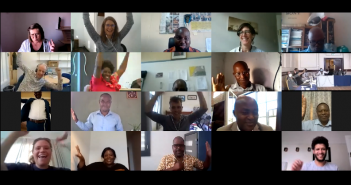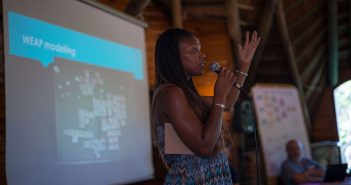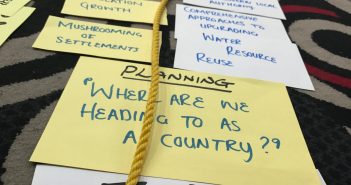By: Lulu van Rooyen (Durban embedded researcher)
I returned from the Barcelona Training School on Transdisciplinary Urban Research with a vital conclusion:
In comparison to the rest of the world we (FRACTAL team members, South Africans, young researchers – place yourself in any group you wish) are second to none when it comes to complex, transdisciplinary approaches, projects, or solution-finding.
Not to say that we do not make mistakes, or that our projects do not also occasionally fail or have unexpected negative outcomes. But for some reason South Africans have a tendency to doubt their abilities and innovations, or look towards developed countries for answers. I, for one, have that mentality. I arrived at the Training School thinking that I am probably overshooting (especially since I had to Google-search half the terms used in the program outline!). I was also expecting to return to South Africa learned in all forms of TD research and project management. Imagine my amazement therefore, when I realized that I somehow had a better grasp on what TD projects entailed than many of the other participants (thank you, FRACTAL!).
Reflecting on the South African situation and the concept of ‘Ubuntu’, gave some insights in why this may be the case. Ubuntu – “I am who I am because of what we are” – speaks about community, ‘oneness’, and trust. In my eyes and from personal experiences, this is one of the foundation stones for successful transdisciplinary research in South Africa. TD projects require co-development (or co-exploration, if I am to use Bruce’s preferred term) of ideas, methods and products/outputs. How do we do this? Through spending time, A LOT of time, to build relationships (or community) and trust between project partners. A TD project cannot be successful if project partners relentlessly push their own agendas and ideas. A TD project cannot move forward if every cog in the wheel is not playing its part. A wise mentor of mine once said that westerners are goal-orientated, while Africans are relationship-orientated. Maybe the TD approach can conveniently cut across both these approaches and fill that uncomfortable ‘third space’. Maybe this is why residents of our continent ought to naturally be good at following the TD approach. Or maybe I am just over thinking all of this…?
The training school as well as the ICCS conference thereafter has provoked many deliberations within me on what makes a project fail. From my experience in large scale projects it has every bit as much to do with poor communication and misplaced expectations between partners as it has with general bad project management. I had an eye-opening meeting with Chris Jack last week, where I rather coerced him into giving me a ‘Climate 101’ lesson. People passing by asked why I needed to understand climate data and models? I don’t actually. But if I have to vouch for CSAG and the climate information in the eThekwini Municipality, I need to feel comfortable that they really are producing the best information that they can. So while Chris giving me a lecture on GCMs and downscaling will never make me a climate scientist, it does serve to open up the communication line, build trust, and creates the confidence to cross expertise-borders. Often we give too little attention to the unofficial ‘partner management’ aspect of project management, and maybe it is exactly for the above mentioned reasons that it should be assigned as much time and effort as aspects like budget control and reporting. This, of course, is nothing new to the FRACTAL team, and is pretty much the basis on which the project is built, if I understand it correctly. It appears as if FRACTAL might be slightly ahead in the thinking around these issues, since the idea of these concepts came up quite a few times at both the Barcelona training school as well as at the ICCS conference, but in a very theoretical way.
The Barcelona Training School was outstanding, though, to convey the theories behind the TD approach. I never knew about the “five competencies” recommended for a project to be successful, or the use of the “Stacey matrix” to understand the complexity of your project, or even the use of art to create cohesion in a group. Other aspects discussed that stood out in my mind (to which I cannot necessarily tie the theme of Ubuntu) is the necessity of reflection, adaptability, and the initial need of a champion (despite the TD approach being inherently all about “co-everything“) in a successful project.
on the whole I will still maintain that there is a largely intuitive component to the TD research approach, where the application of the collective mind contemplating the problem from various angles are more valuable than a strongly theoretical approach. I somehow do not think there is space in the TD environment for rigidity (although this does not mean that good planning must fly out the window). I guess this approach is a learning curve for us all, and I feel excited to know that I am a young researcher working in this dynamic (and scary) environment. Thank you, to everyone involved in FRACTAL, for giving me this opportunity to be part of this exciting project, and allow me the space to grow and build my knowledge and expertise!




